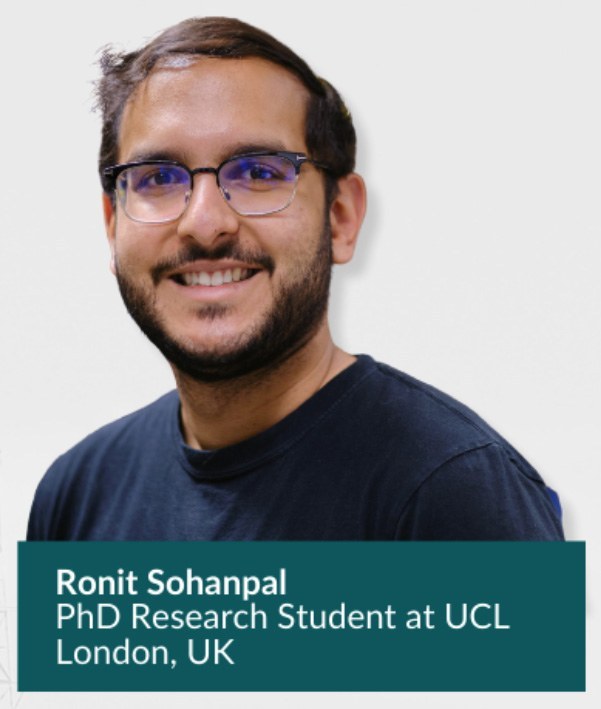
PhD researcher on IPES CDT recognised as one of the visionaries shaping our digital world
Ronit Sohanpal, PhD researcher on the EPSRC Centre for Doctoral Training in Integrated Photonic and Electronic Systems (IPES CDT), has been awarded the 2023 Paul Baran Young Scholars Award. This award recognises researchers for their contributions to the fields of advanced communications and information technology, their leadership and commitment to digital equity.
In an era defined by rapid technological advancement, the Marconi Society is proud to recognise visionary researchers who are driving innovation in their fields, with a unique focus on solving complex problems that have the potential to reshape our digital world. Ronit Sohanpal is amongst the 2023 Paul Baran Young Scholars awardees, recognised for their contributions to the fields of advanced communications and information technology, their leadership and commitment to digital equity.
Ronit Sohanpal: Revolutionizing Submarine Fiber Optic Cables with Optical Frequency Combs
Submarine optical cables are massive highways carrying over 99% of global data and posing challenges related to cost, size, and complexity. Ronit Sohanpal of University College London is on a mission to revolutionise this critical infrastructure by exploring the potential of optical frequency combs.
“My research investigates ways to generate and use alternative light sources, called optical frequency combs, to replace the large laser arrays used in wavelength-division multiplexing (WDM) systems. A frequency comb is a laser source that outputs multiple equally spaced wavelengths simultaneously but requires only a single laser to generate,” said Sohanpal.
“Using combs we can reduce the cost, size and power consumption of the optical transmitter to facilitate larger, more efficient WDM systems. A key part of my research is looking at how we can use novel materials and waveguides (like silicon core fibre) to generate nonlinear frequency combs with low noise and several hundreds of individual wavelengths that can be used in modern telecommunications networks.”
Sohanpal was drawn to this field because of the way in which fundamental optical fibre physics determines how we design and create optical networks, and therefore directly impacts millions of people’s daily lives. “There’s been a lot of interest in frequency combs for telecommunications applications in the last decade. The engineering community is also exploring combs in fibre-adjacent applications, like radio-frequency signal processing, wireless communications, and sensing,” Sohanpal tells us. “The best thing about working on optical sources is that you aren’t tied to a specific application, so there’s a very large scope of possible applications to explore. I think that’s very exciting!”
For Sohanpal, digital equity is not just a concept but a mission. His work in optical communications aims to bridge the digital divide and promote equal access to information and resources. “It is disheartening to know that so many young people across the world are limited by poor network infrastructure or computer access. As researchers in ICT, I believe we have a responsibility to ensure everyone can live in a world where the internet is safe, open, and accessible to all,” says Sohanpal.
The Guiding Light of Mentorship
Mentorship plays a crucial role in a researcher’s career. Ronit acknowledges his PhD supervisor, Dr Zhixin Liu. “He always encourages me and the rest of his students to think big. His ambitious and energetic approach to research has taught me a lot about how to generate my own research momentum.”
Ronit and other 2023 Paul Baran Young Scholars awardees represent a diverse group of young scientists and engineers who are making a profound impact on our interconnected world. These brilliant minds are leaders in the fields of advanced communications and information technology. Their innovations will shape our future, creating a more digitally inclusive world where technology benefits everyone, regardless of their background or location.
Ronit reminds us of the essence of success, saying,
“make sure you love what you do! Passion for your field is paramount, not only for achieving research success but also for making connections with other members of the scientific community.”
About Ronit Sohanpal: https://www.ucl.ac.uk/iccs/ronit-sohanpal
Ronit joined the EPSRC Centre for Doctoral Training in Integrated Photonic and Electronic Systems (IPES CDT), completing his MRes degree in 2019 and more recently, his PhD in the field of high-performance frequency combs for RF signal processing and data centre interconnections under the supervision of Dr Zhixin Liu. Ronit’s PhD research project is funded by EPSRC Centre for Doctoral Training in Integrated Photonic and Electronic Systems (IPES CDT) (programme grant EP/L015455/1).
About the Marconi Society: https://marconisociety.org/
The Marconi Society envisions a world in which everyone can create opportunity through the benefits of connectivity. The organization celebrates, inspires, and connects individuals building tomorrow’s technologies in service of a digitally inclusive world.
About the Marconi Society Paul Baran Young Scholar Award: https://marconisociety.org/young-scholar-award/
The Marconi Society Paul Baran Young Scholar Award honors the world’s most innovative young engineers in Information and Communications Technology (ICT). Presented to researchers who are 27 years old or younger to commemorate Guglielmo Marconi’s age when he made his first successful wireless transmission, this award recognizes scientists and engineers who have shown extraordinary technical acumen, creativity and promise for using ICT in service of digital inclusion.
Read the full article: here
Original publication: October 2023, The Marconi Society.
Image: © The Marconi Society 2023
